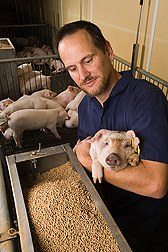This page has been archived and is being provided for reference purposes only. The page is no longer being updated, and therefore, links on the page may be invalid.
Read the magazine story to find out more. |
|
|
Piglet Feed Supplements Support Immune Systems
By Ann PerryFebruary 4, 2009
As feed costs rise and the production of ethanol from corn grain increases, swine producers have ramped up their search for new feed supplements for younger swine. According to studies by Agricultural Research Service (ARS) scientists, feeding dried distiller's grains (DDGS) to piglets can give their immune systems an extra boost.
The U.S. ethanol industry generates an estimated 10-14 million metric tons of DDGS annually from the milling of corn grain that yields fermentable sugars for conversion into fuel alcohol. The majority of DDGS are fed to beef and dairy cattle.
But livestock producers also use DDGS to supplement the diet of older pigs. So Tom Weber, a physiologist at the ARS Swine Odor and Manure Management Research Unit in Ames, Iowa, partnered with research leader Brian Kerr and microbiologist Cherie Ziemer to study the effects of feeding DDGS to young pigs.
For their research on piglets, the team divided weanling pigs into four groups and fed them either a standard control diet or diets supplemented with DDGS, soybean hulls or citrus pulp. After one week, the researchers observed an increase in cytokine expression in the pigs’ small intestine, which they linked to DDGS consumption. Cytokines are chemical messengers that are essential for proper immune function.
This response reinforced findings of previous DDGS studies showing that pigs consuming diets supplemented with DDGS exhibited reduced levels of ileitis, a common inflammation of the small intestine.
Kerr and others have found that adult pigs can be fed with a corn and soy-meal feed that is up to 40 percent DDGS. However, piglets are given feed with a maximum DDG content of 7.5 percent, because their growth may be reduced when they consume too much fiber.
Read more about this research in the February 2009 issue of Agricultural Research magazine.
ARS is the principal intramural scientific research agency of the U.S. Department of Agriculture.

